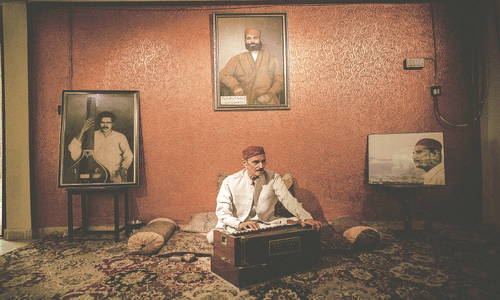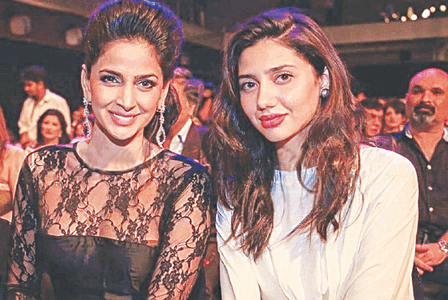
The Neha Laaj-produced partially real, partially made up biopic of the notorious and famed super cop Chaudhry Aslam is a hot mess. From what this critic has learned, both from the producer and sources close to the production, it could have been a disaster of unimaginable proportions (more on this later). So I guess a round of applause is in order…for whatever it’s worth.
Chaudhry — The Martyr is a two-hour-and-15-minute-long collection of vignettes — not a story — from Aslam’s life. In the film, Chaudhry Aslam is played by another Chaudhry — Chaudhry Tariq Islam, his cousin who is also a DSP. Since Islam knew Aslam’s body language, and looks the part, the casting feels picture perfect. However, it’s a pity that the film stops at just the superficiality of looks and back-stories, because we don’t get to learn who Aslam really was from Zeeshan Junaid’s screenplay.
Starting on January 9, 2014 — the day Aslam was killed in an explosion — we meet Kashan (Yasir Hussain, miscast and misused), a reporter who wants to figure out what kind of a man Aslam is.
“Is he a hero or a villain? What is he,” Kashan asks. Even Zoya (Nawal Saeed), his girlfriend (at least that is what the story hints at), who is a supporter of Aslam, doesn’t know the answer.
Chaudhry is a product of wild ambitions that doesn’t know who it’s catering to
As if in a state of perpetual conundrum, Kashan ponders this question aloud time and again during the intercutting flashback sequences, and on the stage where he is giving the aforementioned presentation on Aslam, his team of cops and the notorious villains the super cop was after.
But what exactly is the reason for this presentation of power point slides (as the scenes clarify later, Kashan was making a documentary on Aslam but what he presents is no documentary). And why is he giving it to the audience of police superiors and Aslam’s wife Noreen (Sana Fakhar) who knew exactly who Aslam was.
Kashan’s address is morose and somber, almost like an obituary — but how can it be one, one wonders, as Aslam is still alive when the presentation is in progress (remember: it happens at the same day and time as Aslam’s death). Kashan couldn’t have made the presentation with the fore knowledge of Aslam’s death, or were the time and day stamps — visible on screen when Aslam was killed, and when Kashan was in the midst of his speech at the podium — simply typos?
The mystery clunkily unravels at the parting shots of the film. For the inquisitive ones reading this review, here’s a hint: it wasn’t a typo.
Let’s just say that Kashan’s presentation wasn’t the best creative decision of the film…but then again, it was but one of the many gaffes in Chaudhry.
The story — if you can call the sequences that are stitched together a story — zips back and forth in time (thankfully the time stamps act as guides), as we learn from the cues of Kashan’s speech about a young Aslam (played by another actor) who becomes a cop and then a super cop. Aslam hates the gang leaders who are terrorising Karachi, is affable to his officers, loves his children and wife and doesn’t wear black. Always clad in a white kurta shalwar, black is unlucky for him Aslam tells his wife before a song. At her behest, he wears back and promptly ends up in jail.
During the shuffle of scenes, we meet a few cops — Azfar Ali, Arbaaz Khan, Adnan Shah Tipu, Shamoon Abbasi — all utterly wasted — and Saleem Mairaj.
Mairaj, playing one of Aslam’s happy-go-lucky subordinates, has a good role that’s cuts off as soon as his character begins connecting to the audience. The same goes for Irfan Motiwala who plays the right-hand of a political hopeful played by Sohail Sameer (another good addition). Motiwala’s character, whose wife is played by actress Jia Ali, is an honest man but like Mairaj, his role is jettisoned out of the story as soon as the actor develops a connection with the audience.
Aamir Qureshi plays the other hoodlum whose gangs are menacing Karachi. His subordinates include the muscle-bound rapist played by Dodi Khan (he was the right-hand hood of Nayyer Ejaz’s character from Ghabrana Nahin Hai) and the drug-peddling Imran Rizvi.
Rizvi’s character has an abysmal overarching story about a young college couple whom he terrorises, that is shoehorned into the loosely connected series of events. The film could have done without it…but then it could have done without a lot of things.
A four-hour-long cut of Chaudhry was directed by Azeem Sajjad that made even less sense (Sajjad’s last venture was the unforgivable 8969). According to the nightmarish behind-the-scenes story, Sajjad overshot the film without coherence, exceeding the budget by a fair number of crores. The film was taken over by the producer Neha Laaj, who reshot the film herself to make some sense out of the footage she had. Although structurally compromised, the producer and un-credited director at least do a commendable job in making a makeshift narrative out of the disarray.
Chaudhry is a product of wild ambitions that doesn’t know who it is catering to. Is it a soft soap for the police department? Is it a commemoration for the hero cop who is much more than his presumed public image? Is it a serious film about the wretched state of the city, and the crusade against crime?
Inspired by Bollywood gang war films, this mess of a film is painstakingly made — anyone with a semblance of intelligence can guess it because it is unmistakable on the big screen. Shot like a feature film at times and graded like a Sanjay Gupta actioner, the film forces as many cliches as it can into the mix to hit benchmarks of the underworld action subgenre from 2000’s Bollywood. The plot almost makes sense, but the way the narrative is stitched is atrocious.
The songs don’t help the film at all. The title track, Laggi Paar, which runs mostly as a background anthem, fits scenes just fine — but it is the only exception. An ‘item’ song, Aatish Meri Beauty, where Amna Illyas does a sensual cameo as a dancer (it is sung by Sunidhi Chauhan and underwhelmingly choreographed by Wahab Shah) and a rendition of Kameez Teri Kaali featuring Ataullah Essa Khelvi are forced fodders that compel audiences to check their watches.
Perhaps there was no other way to complete Chaudhry. Perhaps the story would have been served better if the film had a bound screenplay with fewer actors, and more prudent character arcs (you don’t need 40-odd characters to make a good film; five do just fine).
However, perhaps is just wishful thinking. It cannot change the film from what it is: a disappointment.
Released by Hum Films, Chaudhry — The Martyr was released on June 24, and is playing in cinemas
Published in Dawn, ICON, July 3rd, 2022



































